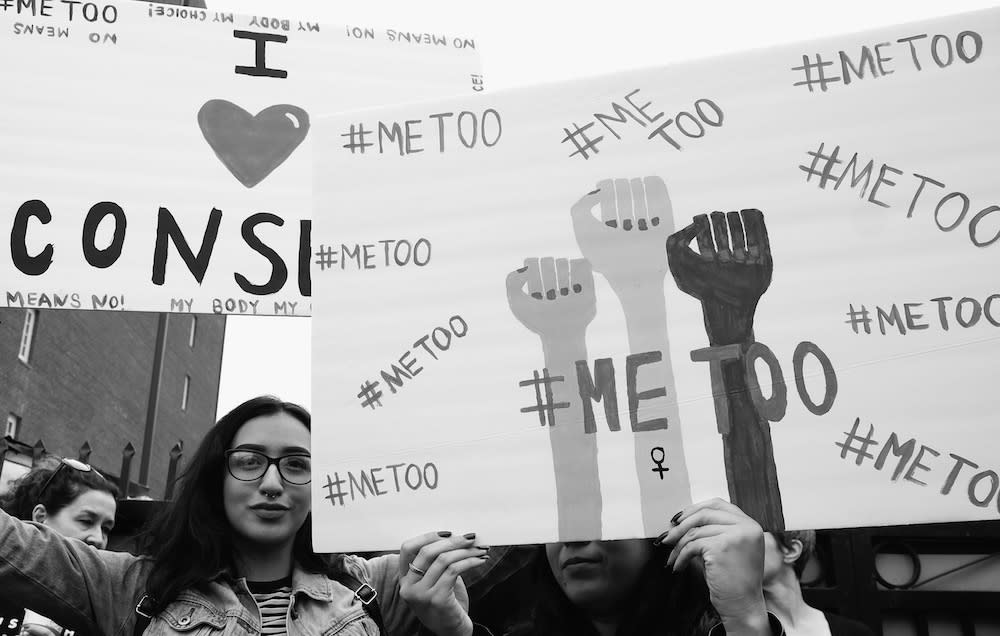Dr. Janet Stemwedel’s Twitter thread illustrates the mental gymnastics one completes before deciding to speak out about a sexual assault
If you or someone you know has been a victim of sexual assault or harassment, you understand the mental gymnastics necessary for survivors to speak out against their perpetrators. In recent months, countless women and men across industries have bravely come forward with their personal stories of workplace sexual harassment and assault at the hands of powerful men. So many, in fact, that “Me Too,” a phrased coined by a black woman named Tarana Burke to connect survivors of sexual violence and raise consciousness about its prevalence, has become more than a hashtag. It’s a movement. And it’s grown so much that last week, TIME even named the #MeToo silence breakers as their “Person of the Year.”
But one aspect of survivors’ experience with sexual assault, both in and out of the workplace, often does not receive its due. And that is the mental, emotional, and professional toll of naming one’s perpetrator. That’s why when Janet D. Stemwedel, a professor of philosophy at San José State University, took to Twitter with her own #MeToo story of workplace sexual harassment, she made a point to school users as to why so many victims struggle to go public with their experiences, too.
We think Dr. Stemwedel’s thoughtful thread should be required reading for everyone.
Noting from the outset that she does not intend to pursue legal or professional consequences for her perpetrator, in a series of tweets, Stemwedel predicts, in no particular order, what will happen when she names her “most significant harasser” in her professional discipline some 23 years on.
Things I predict will happen when I name my most significant harasser in my discipline, not necessarily in chronological order:
— Janet D. Stemwedel (@docfreeride) December 8, 2017
His colleagues & fans will speak to his philosophical contributions.
They will question my philosophical contributions.— Janet D. Stemwedel (@docfreeride) December 8, 2017
From weighing the significance of her perpetrator’s academic contributions against her own in their shared field to comparing her experiences with her attacker to that of her colleagues, Stemwedel methodically breaks down every argument lodged against victims who speak out.
She illustrates each aspect of the reaction to accusations that helps to keep sexual assault victims silent.
There will be women who’ve worked or studied with him announcing that he never harassed or assaulted THEM, so …
— Janet D. Stemwedel (@docfreeride) December 8, 2017
My history will be scrutinized to determine whether I have some grievance against him I’m trying to advance by naming him.
— Janet D. Stemwedel (@docfreeride) December 8, 2017
My history will be scrutinized to discover mental health issues that would make it OK to dismiss my testimony about what happened.
— Janet D. Stemwedel (@docfreeride) December 8, 2017
In true academic fashion, Stemwedel leaves no probable outcome unexamined.
My history will be scrutinized for any not-hostile interactions with him in the 23 years since he sexually assaulted me.
— Janet D. Stemwedel (@docfreeride) December 8, 2017
The very fact that 23 years have elapsed will be used to decide the sexual assault must not have been that bad, if it even happened.
— Janet D. Stemwedel (@docfreeride) December 8, 2017
His supporters will point to his public stance as an advocate for women in philosophy to deny that he would of assaulted me, or to say my assault is less important than his advocacy.
— Janet D. Stemwedel (@docfreeride) December 8, 2017
And Stemwedel’s peers are giving her spot-on analysis high marks on Twitter. Users shared the A+ thread nearly 4,000 times and it received over 7,000 likes in less than 24 hours.
These dynamics play out everyday and, as you show, sexual harassers are cocooned by the multiple ways women are dismissed, silenced and revictimised.
I'm sorry this happened to you Janet. Appreciate you sharing your analysis of this damaging pattern.— Dr Zuleyka Zevallos (@OtherSociology) December 8, 2017
We couldn’t agree more.


